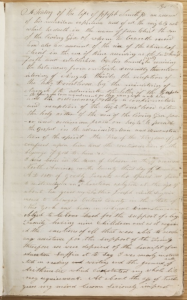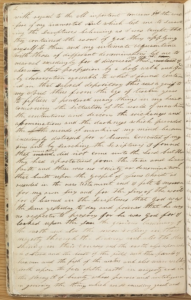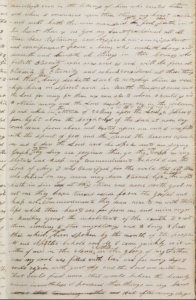In my last post I wrote about the dilemma between Joseph’s head and heart that led him to seek and receive the revelation we call his first vision. I promised to use this post to write about Joseph’s other dilemma, the one that kept him from telling his story, and that shaped the way he told it when he finally decided to do so. Here goes:
Joseph Smith was in his mid-twenties
He was hundreds of miles from home, anxious about his family and about his soul. He was in Greenville, Indiana, nursing Newel Whitney, whose leg had been badly broken in a stage coach accident. As Newel convalesced, Joseph went nearly every day to a grove just outside of town where he could be alone to vent his feelings in prayer. He remembered his past. He recalled his sins. He mourned and wept that he had let “the adversary of my soul . . . have so much power over me.” He remembered that “God is merciful,” and rejoiced that he had been forgiven and received the Comforter.
We know this because Joseph wrote it all to Emma
his wife, of more than five years who was having her own ordeal trying to find a home for herself and daughter, Julia, in Kirtland, Ohio. The letter is in Joseph’s hand. It is composed of just two sentences. Their average length is about 300 words. In them, Joseph jumped from topic to topic. He was a jumble of emotions. He spelled creatively. He asked Emma to excuse “my inability in convaying my ideas in writing.”
The inability to convey his ideas in writing was one of the horns of Joseph’s dilemma
The other was that he had been commanded to convey his ideas in writing. The Lord had told him to keep a record, and in it to tell the world of his calling as a seer, a translator, a prophet, and an apostle of Jesus Christ (D&C 21).
Joseph had translated the Book of Mormon
Oliver Cowdery had written it. Joseph had recorded dozens of revelation manuscripts, mainly in the voice of Jesus Christ, and mostly dictated by Joseph as someone else wrote. These documents testified indeed that he was a seer, a translator, a prophet, an apostle. But none of them told the story of his first revelation. There was no record of it in June 1832 when he wrote to Emma.
Joseph had no problem preaching the Book of Mormon
Moreover, he was planning to publish 10,000 copies of the Lord’s revelations to him. His first vision was different, however. It was one thing for Joseph to pray his conflicted thoughts and deep feelings in the woods, out of sight and earshot. That, he had learned, was safe. God was forgiving and upbraided not. However, the first time Joseph told his vision (and the last until 1832, so far as we know), a minister upbraided him plenty. “Telling the story,” Joseph eventually explained, “had excited a great deal of prejudice against me among professors of religion and was the cause of great persecution.”
We can make sense of Joseph’s reluctance
to tell the story of his first vision, and of the varied ways he eventually told it, if we are aware at the outset of the two horns of his dilemma:
- He had to tell his experience
- He felt he was incapable of it
Joseph returned to Kirtland shortly after writing to Emma, and shortly after that he and his counselor/scribe Frederick Williams recorded Joseph’s first vision, probably for the first time since it occurred twelve years earlier. Frederick wrote this impressive introduction:
A History of the life of Joseph Smith Jr. an account of his marvilous experience and of all the mighty acts which he doeth in the name of Jesus Ch[r]ist the son of the living God of whom he beareth record and also an account of the rise of the church of Christ in the eve of time according as the Lord brought forth and established by his hand.

Then Frederick listed Joseph’s apostolic credentials: four impressive events in Joseph’s life that readers could expect to learn about in the pages that followed. First, “the testamony from on high,” or what Saints would later learn to call the first vision. Second, “the ministering of angels,” meaning Moroni’s mentoring of Joseph beginning in 1823. Third, “the reception of the holy Priesthood by the ministering of Aangels to administer the letter of the Gospel,” meaning the restoration of what saints would later call the Aaronic priesthood. Finally, “a confirmation and reception of the high priesthood after the holy order of the son of the living God.”
Note that this transcription is based on the one at josephsmithpapers.org. Bold typeface indicates Joseph Smith’s handwriting while the regular typeface is the writing of Frederick Williams. Angle brackets <like this> enclose words one of them put in afterwards. Strikeouts indicate words they deleted. Square brackets [like this] enclose text The Joseph Smith Papers editors supplied to improve readability.
No one knows why Joseph decided to pick up the pen right there and finish the thought, referring to himself in the third person, as Frederick had been doing: “the Kees of the Kingdom of God conferred upon him and the continuation of the blessings of God to him.”
Then Joseph dragged the pen across the page, making a line to separate the introduction from what came next. Below that line, Joseph wrote about himself in the first person, and all the confidence of the introduction vanished:
I was born in the town of Charon in the <State> of Vermont North America on the twenty third day of December AD 1805 of goodly Parents who spared no pains to instruct<ing> me in <the> christian religion at the age of about ten years my Father Joseph Smith Seignior moved to Palmyra Ontario County in the State of New York and being in indigent circumstances were obliged to labour hard for the support of a large Family having nine chilldren and as it required their exertions of all that were able to render any assistance for the support of the Family therefore we were deprived of the bennifit of an education suffice it to say I was mearly instructtid in reading and writing and the ground <rules> of Arithmatic which const[it]uted my whole literary acquirements.
Joseph confessed and exposed his mere literary abilities on the opening page. Here in his earliest autobiography, he highlights the horns of his dilemma: he has a marvelous experience to share, and he feels inadequate to share it. In a single sentence of 137 words, there are misspellings, awkward phrases, misplaced modifiers, and no punctuation. It’s natural to wonder why Joseph waited twelve years to write an account of his vision. Discovering how burdened he felt by that task leads us to appreciate the fact that he ever wrote it at all.

The document is not just the sum of Joseph’s literary limits
It also includes a raw, unfiltered, and beautiful account of one of the most marvelous and consequential events to ever occur. James Allen was a young history professor at BYU when he learned of Joseph’s 1832 autobiography in the early 1960s. He went to the Church Administration Building to study it and was overjoyed. This is Joseph Smith pure and simple, Allen thought, giving his feelings as best he could remember them and writing them out by himself.
Professor Allen joyfully told me about that day
“As I read that first account of the First Vision, there was that feeling that came over me that I don’t think I’d ever experienced before and not quite like anything I’ve experienced since. It said to me, ‘This young man is telling the truth.’ It was powerful story, a handwritten story that didn’t have very good grammar, nor punctuation.” Professor Allen said, “That confirmed the testimony that I already had, confirmed the reality and the honesty and integrity of the story of the First Vision.”

Read Joseph’s earliest account of his vision for yourself
What do you think? What do you feel? Do you hear the literary limitations that worried Joseph? Do you hear his marvelous experience? Can you sense the tension between those two forces?
At about the age of twelve years my mind become seriously imprest with regard to the all importent concerns of for the wellfare of my immortal Soul which led me to searching the scriptures believeing as I was taught, that they contained the word of God thus applying myself to them and my intimate acquaintance with those of differant denominations led me to marvel excedingly for I discovered that <they did not adorn> instead of adorning their profession by a holy walk and Godly conversation agreeable to what I found contained in that sacred depository this was a grief to my Soul thus from the age of twelve years to fifteen I pondered many things in my heart concerning the sittuation of the world of mankind the contentions and divi[si]ons the wicke[d]ness and abominations and the darkness which pervaded the of the minds of mankind my mind become excedingly distressed for I become convicted of my sins and by searching the scriptures I found that mand <mankind> did not come unto the Lord but that they had apostatised from the true and liveing faith and there was no society or denomination that built upon the gospel of Jesus Christ as recorded in the new testament and I felt to mourn for my own sins and for the sins of the world for I learned in the scriptures that God was the same yesterday to day and forever that he was no respecter to persons for he was God for I looked upon the sun the glorious luminary of the earth and also the moon rolling in their magesty through the heavens and also the stars shining in their courses and the earth also upon which I stood and the beast of the field and the fowls of heaven and the fish of the waters and also man walking forth upon the face of the earth in magesty and in the strength of beauty whose power and intiligence in governing the things which are so exceding great and marvilous even in the likeness of him who created him <them> and when I considered upon these things my heart exclaimed well hath the wise man said the <it is a> fool <that> saith in his heart there is no God my heart exclaimed all all these bear testimony and bespeak an omnipotant and omnipreasant power a being who makith Laws and decreeeth and bindeth all things in their bounds who filleth Eternity who was and is and will be from all Eternity to Eternity and when <I> considered all these things and that <that> being seeketh such to worshep him as worship him in spirit and in truth therefore I cried unto the Lord for mercy for there was none else to whom I could go and to obtain mercy and the Lord heard my cry in the wilderness and while in <the> attitude of calling upon the Lord <in the 16th year of my age> a piller of fire light above the brightness of the sun at noon day come down from above and rested upon me and I was filled with the spirit of god and the <Lord> opened the heavens upon me and I saw the Lord and he spake unto me saying Joseph <my son> thy sins are forgiven thee. go thy <way> walk in my statutes and keep my commandments behold I am the Lord of glory I was crucifyed for the world that all those who believe on my name may have Eternal life <behold> the world lieth in sin and at this time and none doeth good no not one they have turned asside from the gospel and keep not <my> commandments they draw near to me with their lips while their hearts are far from me and mine anger is kindling against the inhabitants of the earth to visit them acording to thir ungodliness and to bring to pass that which <hath> been spoken by the mouth of the prophets and Ap[o]stles behold and lo I come quickly as it [is?] written of me in the cloud <clothed> in the glory of my Father and my soul was filled with love and for many days I could rejoice with great Joy and the Lord was with me but could find none that would believe the hevnly vision nevertheless I pondered these things in my heart
Now think back to the previous post. Are you hearing Joseph? Some readers are too quick to conclude what he means above when he says “the <Lord> opened the heavens upon me and I saw the Lord and he spake unto me.” There’s a lot at stake in the way that line is interpreted. Did Joseph see one being or two? Did he change his story over time? Can he be trusted? I’ll write about those issues in my next post.
Subscribe if you haven’t yet but want to, and consider sharing this post on your feeds or sending a link to someone who might appreciate it.
